|
|
|
Sort Order |
|
|
|
Items / Page
|
|
|
|
|
|
|
| Srl | Item |
| 1 |
ID:
095013
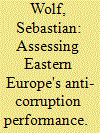

|
|
|
|
|
| Publication |
2010.
|
| Summary/Abstract |
This article compares the results of Council of Europe and Organisation for Economic Co-operation and Development (OECD) anti-corruption monitoring reports to two Transparency International instruments, the Corruption Perceptions Index and the OECD Anti-Bribery Convention Progress Report. It constructs and applies a simple typology (four-cell matrix) consisting of the combinations of good/deficient implementation of international anti-corruption provisions and high/low level of perceived corruption. As the sources and the comparative method used cannot prove causality, the article introduces three ideal types of interpretation to discuss the relevance of the anti-corruption regulatory framework in both domestic and cross-border anti-corruption policies. In the conclusion it is argued that there is a specific Eastern European pattern of anti-corruption performance that implies a need for new strategies.
|
|
|
|
|
|
|
|
|
|
|
|
|
|
|
|
| 2 |
ID:
117198
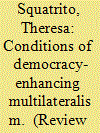

|
|
|
|
|
| Publication |
2012.
|
| Summary/Abstract |
As argued in a recent article by Keohane, Macedo, and Moravcsik, 'democracy-enhancing multilateralism' highlights the potential ways in which international organisations can enhance domestic democracy. The thesis raises an important question about the conditions which shape the likelihood that multilateralism will have such democratising effects. This article responds to the question of conditionality, looking at one way in which democracy may be improved by multilateralism-through the expansion of rights protections. That is, under what conditions will domestic democratic processes garner an improved ability to protect rights as a result of a state's participation in multilateral institutions? Using most likely empirical cases - the European Union (EU) and the Council of Europe (COE) - this article argues that three conditions affect the likelihood that rights expansion will result from multilateral legal institutions. Together the compatibility between the international legal principle and pre-existing domestic law, legal mobilisation, and the precision and obligation of the international law have significant affect on the likelihood of rights expansion. The unique contribution here is a set of conditions that helps to understand when and where rights are likely to expand as a result of a state's participation in international organisations.
|
|
|
|
|
|
|
|
|
|
|
|
|
|
|
|
| 3 |
ID:
180730
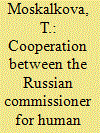

|
|
|
|
|
| Summary/Abstract |
TODAY, we can hardly overestimate the role of integration communities in strengthening the safeguards of human rights and freedoms that are constantly being tested, challenged and threatened in our turbulent world. The Council of Europe, established on May 5, 1949, in response to the disastrous shocks of World War Two caused primarily by massive and cynical violations and even destruction of human rights, plays the leading role on the European continent. It remains the most respected international entity for setting standards for the rule of law, human rights, democratic development and cultural interaction.
|
|
|
|
|
|
|
|
|
|
|
|
|
|
|
|
| 4 |
ID:
180727


|
|
|
|
|
| Summary/Abstract |
THIS YEAR, the Russian Federation will mark the 25th anniversary of its membership of the Council of Europe. The Organization's 39th members state, and one of its most recent, it joined on February 28, 1996. In doing so, Russia has joined a well-established system of treaties and standards with politically and legally binding commitments centered around the European Convention on Human Rights.
|
|
|
|
|
|
|
|
|
|
|
|
|
|
|
|
| 5 |
ID:
149725
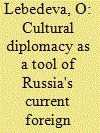

|
|
|
|
|
| Summary/Abstract |
This obviously also applies to Russia's current cultural diplomacy. Yevgeny Shmagin, Deputy Director of the Department on Cultural Affairs and Ties with UNESCO of the Russian Ministry of Foreign Affairs, underscores in his article "Culture and Diplomacy" published in International Affairs the importance of cultural diplomacy in implementing the state's foreign-policy strategy, maintaining, in particular, that "the union of diplomacy and culture has at all times served Russia's national interests, over and over again demonstrating its vitality at different stages in our history. It was cultural diplomacy with its specific set of instruments and methods to influence public opinion that was able to essentially dissolve the ice of hostile and sometimes openly biased attitudes with regard to our country during its Soviet period, mitigating the impact of various negative tendencies of political and ideological nature. During the formation of new Russian state, cultural initiatives once again helped strengthen the country's international prestige, its reputation, demonstrate the Russian society's openness, serve as an evidence of Russia's revival, and its development as a free and democratic state."
|
|
|
|
|
|
|
|
|
|
|
|
|
|
|
|
| 6 |
ID:
158179
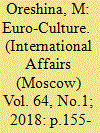

|
|
|
|
|
| Summary/Abstract |
WITH ITS ECONOMIES SHAKEN by financial woes and its system of fundamental values - democracy, the rule of law, and human rights - watered down, the European Union attaches special importance to cultural affairs, seeing them as the core of its foreign policy and the basis for its social and economic development.1 Before 1992, cultural and creative industries in the EU had been under the exclusive jurisdiction of member states. However, after the Treaty of Maastricht was signed, cultural policy became the prerogative of EU authorities, speeded up the revision of the EU's image, was one of the motives for reconsidering the European unity idea, which was rapidly losing its popularity, and, in a sense, counterbalanced European integration projects.
|
|
|
|
|
|
|
|
|
|
|
|
|
|
|
|
| 7 |
ID:
080704
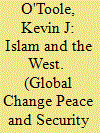

|
|
|
|
|
| Publication |
2008.
|
| Summary/Abstract |
Whether or not the notion of the world as made of civilizations in varying degrees of alliance or conflict is valid, and however reliable or unreliable the idea of an 'Islamic World' or a 'Western World', it is an indisputable reality that there are histories and institutions that are described by and purport to be 'of the West' and 'of Islam'. Indeed, it is commonplace in discourse about international affairs to refer to Islam and the West as distinguishable by values and the 57 nations that comprise the Organization of the Islamic Conference (the OIC) and the 47 nations that comprise the Council of Europe (COE) purport to represent the values respectively of Islam and the West. As usually expressed, however, the frequently used comparative values individualism, piety, liberalism, rule of law, family, abstemiousness and so on are, epistemologically, arguably worthless. Can values be identified for Islam and the West that provide an epistemologically valid distinction? When the OIC and the COE are analysed by reference to what they say and do, the analysis being tested for consistency against the historical origins of these organizations, a case can be made that epistemologically useful respective values can be identified. Thus, for each of the person who will be referred to as 'the Muslim Man' and the person who will be referred to as 'the Western Man', there is distinct doctrine and practice. The doctrine and practice of the Muslim Man extol a virtue of conviction. The doctrine and practice of the Western Man extol a virtue of doubt. For the Muslim Man conviction is unconditional, for the Western Man conviction is contingent; the one enjoys unconditional certainty, the legacy of a revelation; the other suffers reservation, the legacy of an experience of error. What for one is a virtue, for the other is a vice. Their respective dispositions are mutually exclusive.
|
|
|
|
|
|
|
|
|
|
|
|
|
|
|
|
| 8 |
ID:
180729
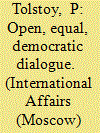

|
|
|
|
|
| Summary/Abstract |
IN THE SUMMER OF 2019, an event took place that we had been waiting for for several years: Russia returned to the Parliamentary Assembly of the Council of Europe, and the rights of the Russian delegation were fully restored.
|
|
|
|
|
|
|
|
|
|
|
|
|
|
|
|
| 9 |
ID:
153707
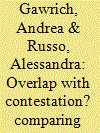

|
|
|
|
|
| Summary/Abstract |
Two sets of regional organizations contribute to the overlapping regionalism in the former Soviet space. On one side we find the Organization for Security and Co-operation in Europe (OSCE) and the Council of Europe (COE), whose original ‘Cold War agenda’ was to enhance the political dialogue across the East–West divide in Europe. On the other side is a kaleidoscopic group of organizations which have been established in the framework of (re-)emerging ambitions of regional leadership, if not hegemony, whose creation has been often interpreted in ‘reactive’ terms, to counterbalance Western influences and projects in the Eurasian geopolitical theatre. The article aims at conceptualizing these regional overlaps, focusing on drivers and effects in terms of regional governance in the post-Soviet region. The authors investigate the similarities and contradictions among four organizations (OSCE, COE, Commonwealth of Independent States and Shanghai Cooperation Organization) from the two different organizational sets, regarding leading norms and policies that address both human and security dimensions.
|
|
|
|
|
|
|
|
|
|
|
|
|
|
|
|
| 10 |
ID:
180728
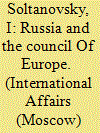

|
|
|
|
|
| Summary/Abstract |
THIS YEAR we are celebrating the quarter-century anniversary of Russia's membership of the Council of Europe (CoE). Twenty-five years is a good time to take stock of the results and make plans based on those results.
I would like to begin with a few words about the organization itself, because, as paradoxical as it may sound, its profile in European politics and in public perception is often very vague. The Council of Europe is often confused with the European Union (EU) or, "at best," equated with the Parliamentary Assembly of the Council of Europe (PACE).
|
|
|
|
|
|
|
|
|
|
|
|
|
|
|
|
| 11 |
ID:
180731
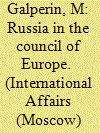

|
|
|
|
|
| Summary/Abstract |
FEBRUARY 28, 2021, marks a quarter century since our country joined the Council of Europe. This anniversary date is a grand opportunity to evaluate our experience and determine further priorities for cooperation.
|
|
|
|
|
|
|
|
|
|
|
|
|
|
|
|
| 12 |
ID:
138786
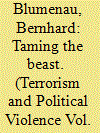

|
|
|
|
|
| Summary/Abstract |
In the 1970s, Western European countries were hit hard by terrorism, especially by international terrorism that crossed borders easily and allowed terrorists of different origins to carry out attacks against both governments and people. Consequently, the necessity of fighting this menace also extended to international organisations. This article looks at how the Council of Europe dealt with the issue, and assesses the negotiations that led to the Convention on the Suppression of Terrorism from the German perspective. West Germany was very interested in establishing a sounder international legal framework against terrorism and thought that the Council of Europe would be able to make an important contribution by abolishing the political offence exception that had so far been a core feature of most extradition treaties. This clause allowed political criminals to escape punishment by fleeing to a country that would deny extradition to a different country on the grounds of the political nature of the act committed by the person in question. The article gives an account and analysis of the complex negotiations that finally resulted in the adoption of the Convention in 1977, as well as of the problems encountered and compromises reached during these negotiations.
|
|
|
|
|
|
|
|
|
|
|
|
|
|
|
|
|
|
|
|
|